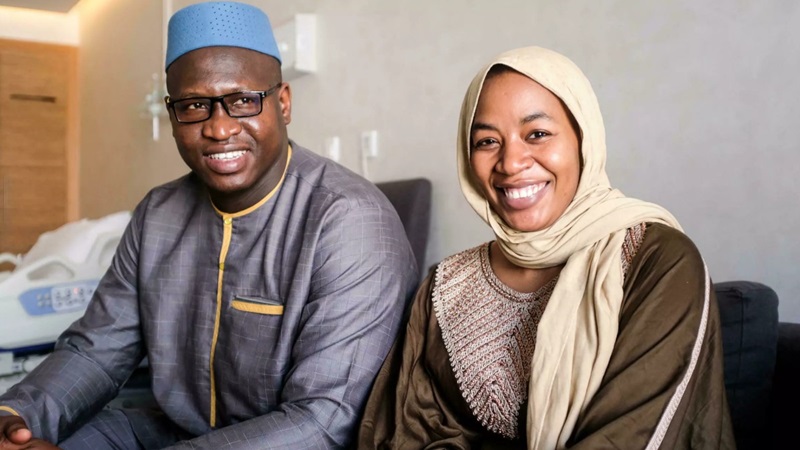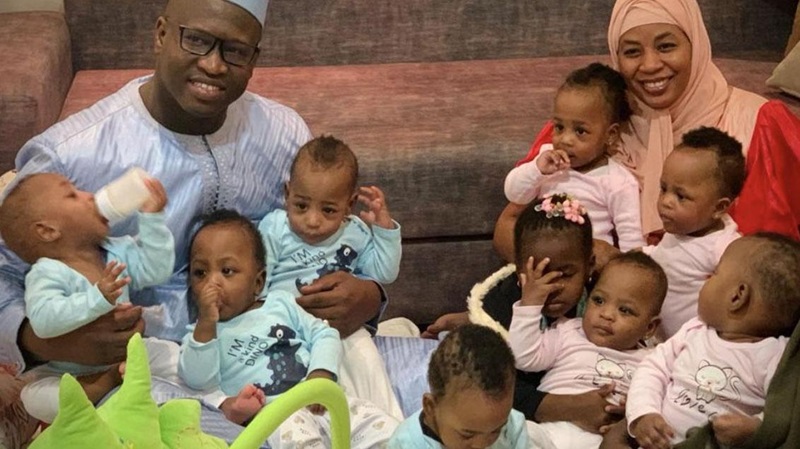After making history as the first set of nonuplets to be born alive, the babies and their mother have finally returned home to Mali from Morocco. The journey was a long and arduous one, filled with challenges and obstacles, but ultimately, it was a triumphant moment for the family. The babies, who were born prematurely and had to spend several weeks in the neonatal intensive care unit, are now healthy and thriving.
Their mother, Halima Cisse, has been hailed as a hero for her strength and resilience throughout the ordeal. The entire country of Mali has been eagerly awaiting their return, and the news of their safe arrival has been met with great joy and celebration. The nonuplets’ story has captured the hearts of people around the world, serving as a beacon of hope and inspiration in these challenging times. As they settle into their new life back home, surrounded by family and loved ones, the nonuplets are sure to continue making headlines and breaking records for years to come.
Historic Journey Home
The Historic Journey Home is a story of individuals seeking a better life for themselves and their families, often at great personal risk. These individuals have left behind their homes, their communities, and their familiar surroundings in search of a brighter future. The journey home is filled with challenges and obstacles, from navigating treacherous terrain to facing uncertain futures.
Despite these difficulties, many are driven by a deep desire to return to their roots and reconnect with their heritage. The journey home is a deeply personal and emotional experience, filled with both joy and sorrow. It is a testament to the resilience and determination of those who embark on this historic journey. Through their courage and perseverance, these individuals are able to reclaim their sense of identity and belonging, finding solace in the familiarity of their homeland. The Historic Journey Home is a reminder of the enduring human spirit and the power of hope in the face of adversity.

Medical Journey and Care
Navigating the medical journey and receiving proper care can be a complex and challenging process. From seeking out a diagnosis to finding the right treatment plan, individuals often face a multitude of obstacles along the way. It is crucial for patients to advocate for themselves and be proactive in their healthcare decisions. This may involve researching medical conditions, seeking second opinions, and asking questions during appointments.
Additionally, building a strong support system of healthcare providers, family, and friends can help individuals feel more confident in their medical journey. Access to quality healthcare is also a key component of receiving proper medical care. Unfortunately, many individuals face barriers such as lack of insurance, financial constraints, or limited access to healthcare facilities. This can greatly impact their ability to receive timely and effective treatment.
As such, it is important for policymakers and healthcare providers to work towards creating a more equitable healthcare system that ensures all individuals have access to the care they need. Overall, the medical journey and receiving proper care is a fundamental aspect of maintaining one’s health and well-being. By being proactive, informed, and advocating for oneself, individuals can navigate the complexities of the healthcare system and receive the care they deserve.
Family and Community Impact
Family and community impact plays a crucial role in shaping the behavior and values of individuals. The bond between family members and the relationships within a community can greatly influence the decisions people make and the way they interact with others. When families are strong and supportive, individuals are more likely to feel a sense of belonging and security, leading to positive outcomes in their personal and professional lives. Similarly, a close-knit community can provide a sense of connection and unity that fosters cooperation and mutual support among its members.
On the other hand, when families are fragmented or communities are divided, individuals may struggle to find their place in the world and may be more susceptible to negative influences. The impact of family and community dynamics can be seen in a variety of ways, from the way children are raised to the way conflicts are resolved within a neighborhood. Ultimately, the strength of family and community ties can determine the overall well-being and success of individuals and societies as a whole.
It is important for individuals to recognize the influence that their families and communities have on their lives and to actively work towards creating a positive and supportive environment for themselves and those around them. By fostering strong relationships with family members and actively participating in their communities, individuals can help create a more cohesive and harmonious society for future generations to thrive in.

Health and Development Monitoring
Health and development monitoring is crucial for ensuring that individuals are able to reach their full potential and lead healthy lives. By regularly tracking key health indicators such as growth, nutrition, and disease prevalence, policymakers and healthcare providers can identify areas of concern and implement targeted interventions to address them.
Monitoring also allows for the evaluation of the effectiveness of health programs and policies, helping to ensure that resources are being used efficiently and that the desired outcomes are being achieved. In addition, monitoring can help to identify disparities in health outcomes among different populations, allowing for the development of targeted interventions to address these inequalities. By closely monitoring health and development indicators, we can better understand the factors that influence health and well-being and work towards creating a more equitable and healthy society for all.

Personal Stories and Experiences
Personal stories and experiences are unique to each individual and offer a glimpse into the diverse tapestry of human life. These stories can range from joyful memories of childhood adventures to heart-wrenching tales of loss and struggle. They shape who we are and how we view the world around us. By sharing our personal stories, we can connect with others on a deeper level and find comfort in knowing that we are not alone in our experiences. Whether it’s a funny anecdote about a memorable trip or a poignant reflection on a difficult time in our lives, our stories have the power to inspire, educate, and unite us.
They remind us of our shared humanity and the common threads that bind us together. Personal stories have the ability to spark empathy, understanding, and compassion in others, fostering a sense of community and solidarity. They serve as a reminder that we are all navigating the complexities of life, facing our own challenges and triumphs along the way. So, let us continue to share our stories, listen to the stories of others, and celebrate the richness and diversity of the human experience.
